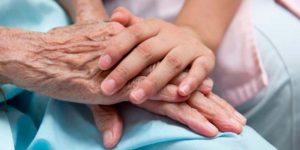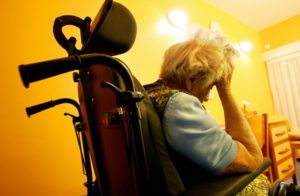 In Portugal – where palliative care is no priority – a first training course of end-of-life doulas has started last September.
In Portugal – where palliative care is no priority – a first training course of end-of-life doulas has started last September.
The program covers topics like active listening, symptoms of chronic ailments, nutrition and hydration, post-mortem care and legacy work.
An end-of-life doula is a professional, who guides the dying and opens up the conversation about death and loss. Topics that are often taboo for the dying and their family. Doulas promote family-led, home-based care and their role can supplement and go beyond hospice care. No easy task in a society that tends to react to sadness with a prescription of antidepressants.
 The term doula originates from ancient Greece meaning a helping individual; a servant or in extreme cases, a slave. Since the 1960s the term is in use for women who support pregnant mothers during childbirth. Unlike midwives, they do not serve in a medical capacity.
The term doula originates from ancient Greece meaning a helping individual; a servant or in extreme cases, a slave. Since the 1960s the term is in use for women who support pregnant mothers during childbirth. Unlike midwives, they do not serve in a medical capacity.
The primary role of the end-of-life doulas is not only to provide emotional, physical and psychological support but also to educate and empower families to exercise their right to care for the dead.
Their work is relatively common in the USA (www.inelda.org), Canada and Brazil and although they are not required to have medical training, many come from the healthcare field.
What happens if the family wants to continue curative care but the patient not?
 ‘It will be up to the doula to act as an intermediary between the needs of each other, to try to harmonize conflicts’, explains nurse Ana Infante, a palliative care nurse and organizer of the course. ‘There are signs and symptoms that are part of the end-of-life process. It is important to know how to recognize them and reassure the family, identifying those that may be causing the dying person discomfort.’
‘It will be up to the doula to act as an intermediary between the needs of each other, to try to harmonize conflicts’, explains nurse Ana Infante, a palliative care nurse and organizer of the course. ‘There are signs and symptoms that are part of the end-of-life process. It is important to know how to recognize them and reassure the family, identifying those that may be causing the dying person discomfort.’
 The work of doulas doesn’t replace that of health professionals and has nothing to do with euthanasia. Doulas do not delay or advance the process of dying: they merely accompany people. This work can be done at home or in hospital as long as the surrounding environment is comfortable, safe and peaceful for the patient.
The work of doulas doesn’t replace that of health professionals and has nothing to do with euthanasia. Doulas do not delay or advance the process of dying: they merely accompany people. This work can be done at home or in hospital as long as the surrounding environment is comfortable, safe and peaceful for the patient.
Aproveite o seu dia Enjoy your day
